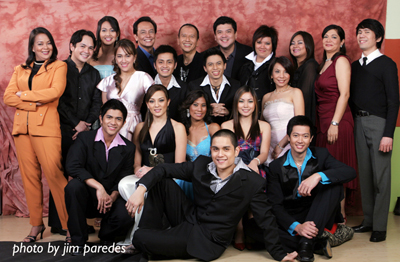Humming in my UNIVERSE By Jim Paredes
The Philippine STAR 12/31/2006
One great big event is over.
Christmas, that moment we anticipate all year long, is almost always a big event for everyone, especially for the children. How can it not be? Christmas is a time when kids get a crack at the jackpot, acquire the goodies they’ve long desired from Santa, their parents, aunties and uncles, ninongs and ninangs.
For us adults, it is a time for giving, which means frantic spending, spending and more spending. We work ourselves into a frenzy decorating our homes to welcome friends and loved ones. For an increasing number of Filipinos, Christmas is all about coming home as balikbayans from somewhere abroad, or being visited abroad by relatives from home.
In the Philippines, Christmas is the culmination of a three-month build-up that starts with the first Christmas carols played over the radio in September and continues into the “ber” months until the end of the Misa de Gallo on Christmas Eve. All over the country, everywhere you look, you see reminders of Christmas or the anticipation of it. The malls, and almost every business establishment and office, are decked out with boughs of holly and trimmings weeks before the event itself. You would have to be deaf to miss Christmas since the noise and gaiety are all over the place, courtesy of the radio, your neighbor’s TV and, closer to Christmas, the pesky neighborhood carolers.
Then a week after Christmas is the other Great Big One – New Year’s Eve. It’s party time and, for many people, it’s time to gorge and drink themselves blind. There is just no chance of life returning to normal until after all these bacchanalian rituals have transpired.
Call me a Grinch, but there is something about this entire holiday season that stopped appealing to me years ago. I feel, and I’ve heard many people say, that the Christmas season, as we know it now, is overrated. All the excess that accompanies Christmas has killed the thrill of it for me, and dimmed the glow that I used to feel even just thinking about Yuletide.
Christmas is simply too nerve-wracking a time, what with the traffic, large crowds at the malls, the obligatory gifts one must give. While stuck in holiday traffic in the past, it has crossed my mind that Christmas as we know it now should only be celebrated once every two or three years.
The entire buildup to the season has become too stressful. There is a neurotic “need” to celebrate and have fun at all cost. Why? Because it’s Christmas and one should be happy at Christmas. There is even a “politically correct” way to be happy during the holidays, and that is to celebrate it materialistically – to feel good by receiving or buying the latest this or that – a view peddled by big consumer companies and commercial establishments.
Surely, one cannot fail to see the madness of the whole thing. I find the entire ideal being peddled of resolute partying and materialism distasteful, trite and vulgar. And that is why I have largely dropped out of that Christmas scene.
To me, the most interesting part of the season is the six-day period after Christmas and before New Year’s. Usually, during those in-between days, I just go into a drift until the evening of December 31. While we get to see friends and family, eat party food and exchange gifts, compared to Christmas and New Year’s Eve, these days are not spectacular. They are even less than ordinary because there is really nothing happening anywhere.
The days stand out in their simplicity between two elaborately celebrated occasions. If we were talking music, they would be grace notes in between loud and memorable themes, or the rests or silences between notes played fortissimo. They could also be compared to the moment between inhaling and exhaling, or the gaps between words, the links that hold the beads of a necklace together. They are understated and uneventful days, but they are necessary and crucial to my sanity.
During those in-between days, I slow down. I have no agenda and spend my time not so much at rest but with nothing specific and necessarily useful to do. The days between Christmas and New Year’s are for on-the-spot indulging in whatever I fancy. I sleep as much as I want, go on the long drive I’ve always wanted to take or just lie down and read a book, take a long walk, or sip wine in the evening while staring at the sunset.
It is a time when the body recuperates, the spirit stops being purposeful and goes on being mode; a time to take stock of the year just passed and reflect on how we spent, wasted, enjoyed or hated it. Perhaps we were even oblivious to it. It is a time to weigh things and determine what they’re worth to us, a time to let go of some of our dreams and unresolved, energy-draining concerns, to mourn losses and failed endeavors. Or it could be a time to celebrate our victories and relish good memories, draw up new dreams and aspirations and plan on new sights, vistas and involvements for our spirit to meander in.
When I allow my body and my spirit this down time, I find that I become more grounded and I am able to make more realistic and meaningful New Year’s resolutions. During this hiatus, I try to synchronize myself with the New Year ahead, and the new shot at renewal and redemption that it promises.
* * *
Write to jim_paredes@yahoo.com.






